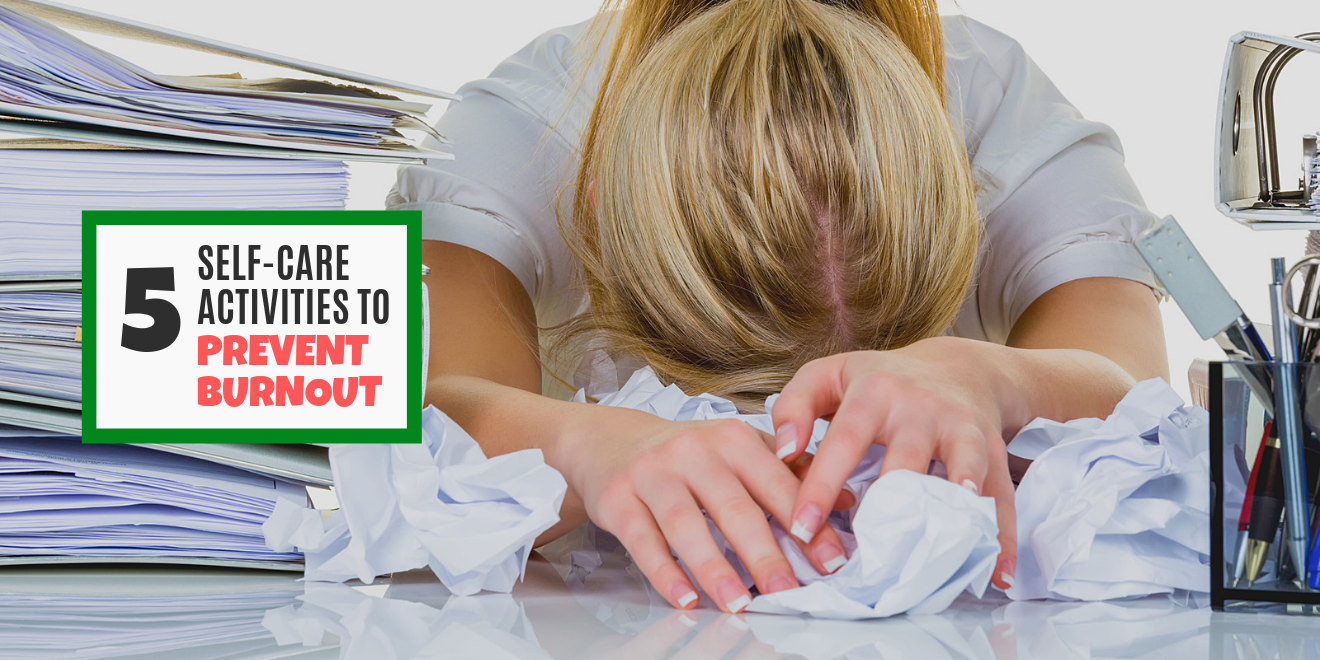How to Help Prevent Burnout with Self-Care

Burnout does not happen to everyone, but when it happens, it's debilitating.
Burnout can be summed up as a continual state of stress and chronic depression that makes you feel "out of control". It leads to an inability to function normally and has long-term mental and physical health repercussions. Basically stated, if you experience high levels of stress on a frequent, continuous basis, you could end up a burned-out shell of your former self.
Fortunately, this is not unavoidable if you lead a high-stress life. The chronic fatigue, insomnia, mental issues, anxiety and depression which are symptoms of burnout are not inevitable. Practice the following 5 self-care activities and you can put stress in its place, avoiding burnout altogether.
Burnout is evidenced by constant and ever-present stress and anxiety. When you feel yourself becoming anxious, take a break. Pull yourself out of the situation which is causing your stress and anxiety. Take several 10 or 15-minute breaks each day to alleviate the stress build-up which can lead to burnout.
https://www.facebook.com/photo.php?fbid=10161334636495454&set=a.10150927043570454&type=3&permPage=1
Consider socializing as nature's answer to stress. Mental health professionals recommend socializing with friends and family members to alleviate stress, anxiety, and depression. Socializing regularly can keep burnout at bay.
https://www.facebook.com/photo.php?fbid=10161393289210454&set=a.10150715968345454&type=3&theater
Research into how the brain works show that "feel good" chemicals are released when you give something away. This can be your time, money or possession. In other words, giving just feels good, and is linked to stress-relief.
https://www.facebook.com/photo.php?fbid=10161510667290454&set=a.10150715968345454&type=3&theater
Regular exercise, even just 20 or 30 minutes or more per day, triggers processes in your body that combat stress. This is the opposite of the "fight or flight" reaction which is normal to stressful situations. During and after exercise, the hormones which are released, and the feelings you experience, fight stress rather than promoting it. Try to get your heart beating at 65% to 75% of your maximum heart rate for the most benefits.
https://www.facebook.com/photo.php?fbid=10160961532290454&set=a.10150927043570454&type=3&permPage=1
Like exercise, proper nutrition empowers your body and mind to deal with stressful situations properly. Eliminate or cut back on the number of processed foods like sugar, salt, fast food, fried foods and restaurant food you eat. If most of your food comes in a wrapper, can or package, it is probably highly processed. Eat more fresh fruits and vegetables, nuts and berries, whole foods and healthy fats.
https://www.facebook.com/photo.php?fbid=10160762459605454&set=a.10150927043570454&type=3&permPage=1
Burnout can be summed up as a continual state of stress and chronic depression that makes you feel "out of control". It leads to an inability to function normally and has long-term mental and physical health repercussions. Basically stated, if you experience high levels of stress on a frequent, continuous basis, you could end up a burned-out shell of your former self.
Fortunately, this is not unavoidable if you lead a high-stress life. The chronic fatigue, insomnia, mental issues, anxiety and depression which are symptoms of burnout are not inevitable. Practice the following 5 self-care activities and you can put stress in its place, avoiding burnout altogether.
5 Self-Care Activities to Help Prevent Burnout
1 – Take a Break
Burnout is evidenced by constant and ever-present stress and anxiety. When you feel yourself becoming anxious, take a break. Pull yourself out of the situation which is causing your stress and anxiety. Take several 10 or 15-minute breaks each day to alleviate the stress build-up which can lead to burnout.
https://www.facebook.com/photo.php?fbid=10161334636495454&set=a.10150927043570454&type=3&permPage=1
2 – Socialize Frequently
Consider socializing as nature's answer to stress. Mental health professionals recommend socializing with friends and family members to alleviate stress, anxiety, and depression. Socializing regularly can keep burnout at bay.
https://www.facebook.com/photo.php?fbid=10161393289210454&set=a.10150715968345454&type=3&theater
3 – Join a Charitable or Non-Profit Organization
Research into how the brain works show that "feel good" chemicals are released when you give something away. This can be your time, money or possession. In other words, giving just feels good, and is linked to stress-relief.
https://www.facebook.com/photo.php?fbid=10161510667290454&set=a.10150715968345454&type=3&theater
4 – Become More Active
Regular exercise, even just 20 or 30 minutes or more per day, triggers processes in your body that combat stress. This is the opposite of the "fight or flight" reaction which is normal to stressful situations. During and after exercise, the hormones which are released, and the feelings you experience, fight stress rather than promoting it. Try to get your heart beating at 65% to 75% of your maximum heart rate for the most benefits.
https://www.facebook.com/photo.php?fbid=10160961532290454&set=a.10150927043570454&type=3&permPage=1
5 – Start Eating like You Know You Should
Like exercise, proper nutrition empowers your body and mind to deal with stressful situations properly. Eliminate or cut back on the number of processed foods like sugar, salt, fast food, fried foods and restaurant food you eat. If most of your food comes in a wrapper, can or package, it is probably highly processed. Eat more fresh fruits and vegetables, nuts and berries, whole foods and healthy fats.
https://www.facebook.com/photo.php?fbid=10160762459605454&set=a.10150927043570454&type=3&permPage=1




































































































